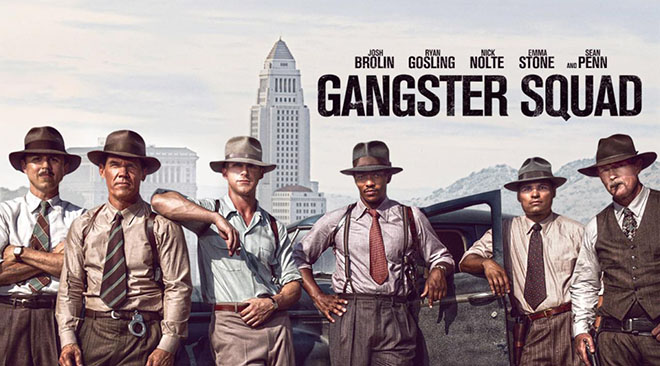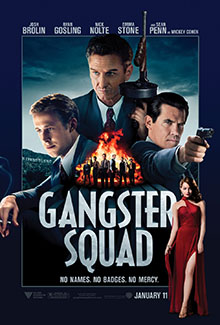Movie Review: Gangster film fails to deliver

Slick cinematography and a flashy style perfectly capture the spirit and the style of post-WWII Los Angeles in Gangster Squad. But its overworked script and one-dimensional characters are style with no substance.
Loosely based on a true story, the movie follows a specialized team of L.A. police officers, led by Sgt. John O’Mara, determined to take down boxer-turned-mobster Mickey Cohen. O’Mara is a decorated war hero and an honest cop who despises corruption in the police force. His refusal to take pay-offs from Cohen makes him a pariah among his fellow officers.
Cohen, a former hit man for Al Capone and “Bugsy” Siegel, is played with brilliant ferocity by Sean Penn. Running L.A.’s crime syndicate with most of the police force in his pocket, Cohen seems unstoppable. O’Mara’s team doesn’t want to kill Cohen; instead, they try to loosen his hold on L.A. by destroying his mob-run businesses and killing his top men.
Given free reign by Police Chief Parker to do whatever it takes, O’Mara and his men are less of a police force, more of a team of vigilantes. They don’t carry badges or handcuffs but use violence to fight violence, burning down Cohen’s businesses and illegally wire-tapping his house. The morality of their methods is only questioned once, when Officer Keeler, one of O’Mara’s men, laments the civilian casualties they caused during a shootout in Chinatown. His moralizing is quickly shrugged off by O’Mara.

The biggest issue with Squad is that it has potential but chooses to trade in grit and emotion in favor of semi-witty dialogue and machine gun-fire, squandering a great cast and good source material for a few laughs and a lot of blood. When dealing with violent subject matter, good films often show the negative effects of violence on society and individuals. Gangster Squad does neither, instead reveling in its bloodshed and glorifying the morally ambiguous actions of its characters without questioning the whether the need for violence is justified.
With its constant references to superior cop and gangster films like L.A. Confidential and The Untouchables, Gangster Squad tries to feel like an epic. But it ends up feeling less like homage and more like a blatant rip-off, especially during the Scarface-inspired shootout between O’Mara’s team and Cohen. The final scene is nearly a frame-by-frame recreation of the final scene in the original Dirty Harry.
Gangster Squad won’t have an easy time with last year’s shootings in Newtown, Connecticut and Aurora, Colorado sure to be on viewer’s minds. An original scene in the film featuring a shootout in a movie theater was rewritten and reshot after the Colorado theater shooting, pushing the film’s release date back from September to January. But the gratuitous and glorified violence of this film doesn’t reflect sensitivity toward, or even acknowledge, real world violence. I don’t believe violent films have a negative impact on society, or that they can turn people into killers. But films like this one, films with a lot of violence but without heart, make it too easy to point fingers at the film industry.
